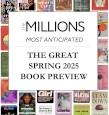House of Beth, the novelist’s gothic-tinged debut, follows an OCD-challenged young woman’s harrowing return to her New Jersey hometown.
You have described your imagination as “terrifyingly overactive.” How do you walk the tightrope of letting it inspire your work without overwhelming you?
It’s tough. I learn how to work better with it all the time. A lot of what was called overactive imagination when I was a kid, I have learned, falls more in the category of OCD, which was hard at first because I had always seen it as something beautiful and useful. Thinking about it as something that I actually had to cure was a difficult reframing. I’m always learning, okay, this is the time when I’m having a horrifying fear spiral and I should write through it, versus this is a time when I should take some deep breaths and go for a walk.
What was your childhood like?
I was raised very Christian until my mom came out of the closet when I was 11, and then eventually, I came out of the closet, too. It was complicated. The New Jersey evangelical church that we grew up in kicked my mom out, and I ended up bouncing back and forth between two worlds. I would go on these youth group retreats, and then I would go to an activist retreat for children with queer parents, and come back and have all these questions for my youth pastor that he wasn’t prepared to talk about.
Beth, the novel’s title character, is a ghost. Did your time at Loyola University in New Orleans influence that choice?
Yes. In New Orleans, it’s very easy to believe in ghosts. In the French Quarter, you’ll walk by real estate signs that say either “haunted” or “not haunted.” But I was raised to invest in angels and demons and biblical warfare and all these concepts that, if they weren’t biblical, would sound very much like fantasy, so I already sort of believed.
Has your work as a freelance editor been helpful to your writing, or does the editor mindset sometimes limit you more than you’d like?
Sometimes it can limit me, but I actually think that limiting is really useful, because it’s too easy for me to have 600 ideas at once and try to write them all at the same time. If the editor in my brain is saying, well, 580 of these are not really that interesting, that helps. I do think that sometimes the editing will drain a lot of my creative energy, and the last thing I’ll want to do after having spent all day editing another manuscript is try to work on my own. But I like the editor in my head. I think she’s very helpful.








